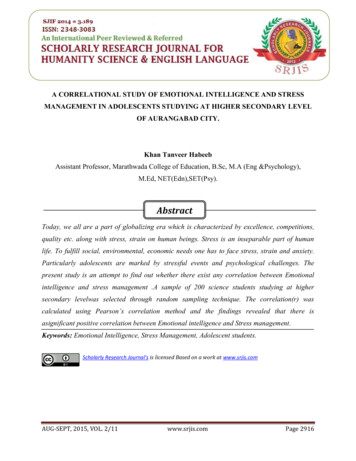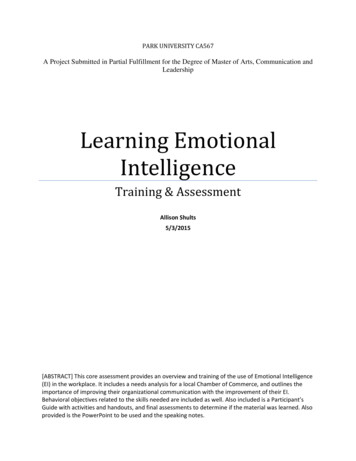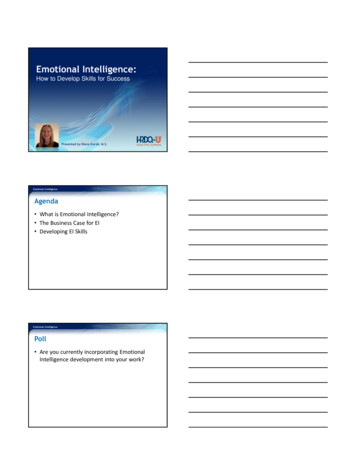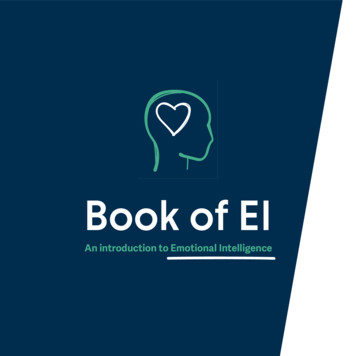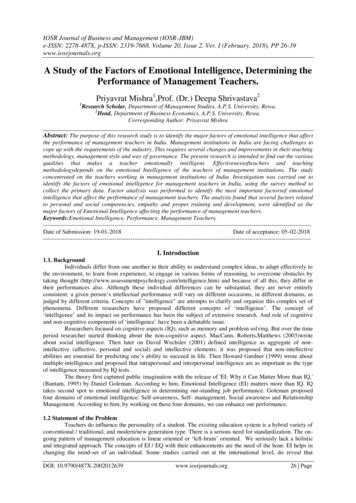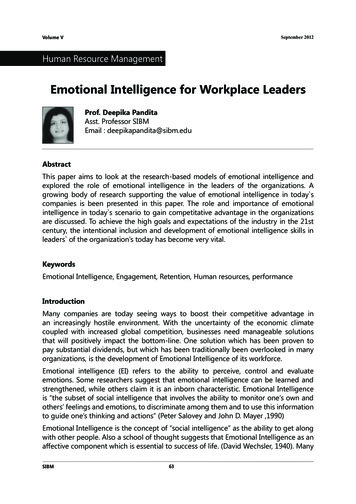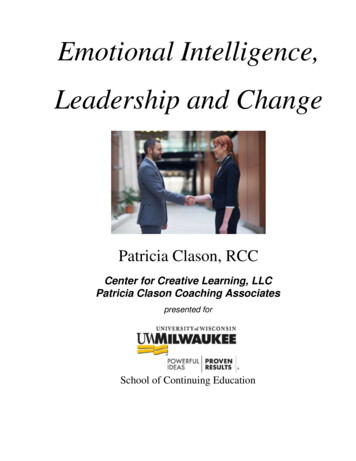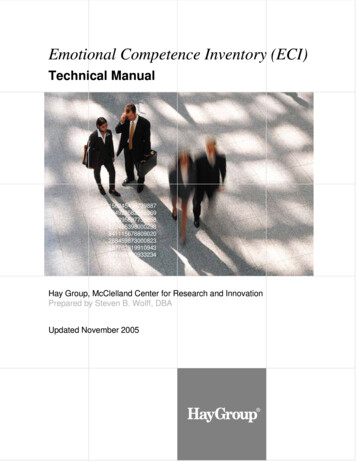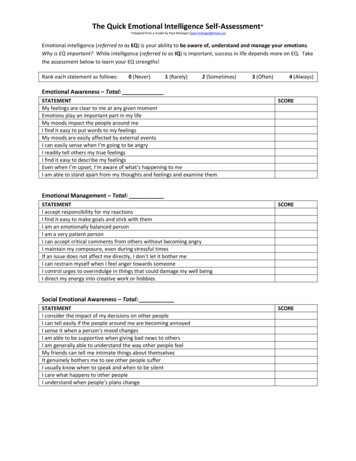
Transcription
The Quick Emotional Intelligence Self-Assessment**Adapted from a model by Paul Mohapel (paul.mohapel@shaw.ca)Emotional intelligence (referred to as EQ) is your ability to be aware of, understand and manage your emotions.Why is EQ important? While intelligence (referred to as IQ) is important, success in life depends more on EQ. Takethe assessment below to learn your EQ strengths!Rank each statement as follows:0 (Never)1 (Rarely)2 (Sometimes)3 (Often)4 (Always)Emotional Awareness – Total:STATEMENTMy feelings are clear to me at any given momentEmotions play an important part in my lifeMy moods impact the people around meI find it easy to put words to my feelingsMy moods are easily affected by external eventsI can easily sense when I’m going to be angryI readily tell others my true feelingsI find it easy to describe my feelingsEven when I’m upset, I’m aware of what’s happening to meI am able to stand apart from my thoughts and feelings and examine themSCOREEmotional Management – Total:STATEMENTI accept responsibility for my reactionsI find it easy to make goals and stick with themI am an emotionally balanced personI am a very patient personI can accept critical comments from others without becoming angryI maintain my composure, even during stressful timesIf an issue does not affect me directly, I don’t let it bother meI can restrain myself when I feel anger towards someoneI control urges to overindulge in things that could damage my well beingI direct my energy into creative work or hobbiesSCORESocial Emotional Awareness – Total:STATEMENTI consider the impact of my decisions on other peopleI can tell easily if the people around me are becoming annoyedI sense it when a person’s mood changesI am able to be supportive when giving bad news to othersI am generally able to understand the way other people feelMy friends can tell me intimate things about themselvesIt genuinely bothers me to see other people sufferI usually know when to speak and when to be silentI care what happens to other peopleI understand when people’s plans changeSCORE
Relationship Management – Total:STATEMENTI am able to show affectionMy relationships are safe places for meI find it easy to share my deep feelings with othersI am good at motivating othersI am a fairly cheerful personIt is easy for me to make friendsPeople tell me I am sociable and funI like helping peopleOthers can depend on meI am able to talk someone down if they are very upsetSCOREMy EQ Strengths!DomainEmotional AwarenessEmotional ManagementSocial Emotional AwarenessRelationship ManagementScoreMeasure your own effectiveness in each domain by using the following key:0 – 24Area for Enrichment: Requires attention and development25 – 34Effective Functioning: Consider strengthening35 – 40Enhanced Skills: Use a leverage to develop weaknesses
To help you develop your EQ skills, use the following information.Self-awareness — the ability to recognize youremotions and their impact.Can you walk into a room, meet a stranger andquickly sense that something is not as itseems? Formerly known as “intuition,” thisinstinctual knowledge is based on emotionalintelligence.Self-management — the ability to control youremotions and behavior and adapt to changingcircumstances.Can you adequately harness your anger,disappointment or fear so your emotions don’tinterfere with your ability to listen or problemsolve? Do you know when you need help, andcan you ask for it?Social awareness — the ability to sense,understand, and react to the emotions ofothers and to feel comfortable socially.Can you tell when you are unintentionallymaking another person uncomfortable or whensomeone who is smiling is really upset?Relationship management — the ability toinspire, influence, and connect to others and tomanage conflict.Can you remain calm, energized and focused inthe face of another’s distress or during anupsetting situation? Can you defuse conflict?1. Self-Awareness – Knowing your internal, cognitive state, preferences, resources andintuitions. Understand negative thought processes/emotional triggersRecognize relationship between thoughts, feelings, and actionsLearn to interrupt negative thinkingThe power of ProactivityAPPLICATIONHow are your strengths and weaknesses in the area of self-awareness impacting your personal andprofessional roles? How would one or more of these situations improve if you were to becomemore self-aware?List one way you can improve your self-awareness:
2. Self-Management – managing your internal emotional/cognitive states, impulses andresources to obtain goals. Identify limiting beliefs Use goal setting and follow up to demonstrate power to change destiny Begin with the end in mind/consider possibilities Change leader Self-regulationAPPLICATIONHow are your strengths and weaknesses in the area of self-management impacting your personaland professional roles? How would one or more of these situations improve if you were to becomemore self-aware?List one way you can improve your self-management:3. Social Awareness - the ability to sense, understand, and react to others' emotions whilecomprehending social networks. Understanding others/empathy Paying attention to body language cues Effective communication skills Recognizing communication blockers Practicing active listeningAPPLICATIONHow are your strengths and weaknesses in the area of social awareness impacting your personaland professional roles? How would one or more of these situations improve if you were to becomemore self-aware?List one way you can improve your social awareness:
4. Social Skills - the ability to inspire, influence and develop others while managing conflict. Learn to be a leaderLearn to be a followerValue contributions of all participantsFollow through on commitmentsUnderstand conflictSeek consensusThe art of listening effectivelyAPPLICATIONHow are your strengths and weaknesses in the area of social skills impacting your personal andprofessional roles? How would one or more of these situations improve if you were to becomemore self-aware?List one way you can improve your social skills:PERSONAL PLAN OF ACTION REGARDING EMOTIONAL INTELLIGENCE: How does this information shape the way you will interact with others? How can you use this information to be better at your job? How can you teach others about EI?
The Quick Emotional Intelligence Self-Assessment* *Adapted from a model by Paul Mohapel (paul.mohapel@shaw.ca) Emotional intelligence (referred to as EQ) is your ability to be aware of, understand and manage your emotions. Why is EQ important? While intelligence (referred to as IQ) is important, success in life depends more on EQ. Take


